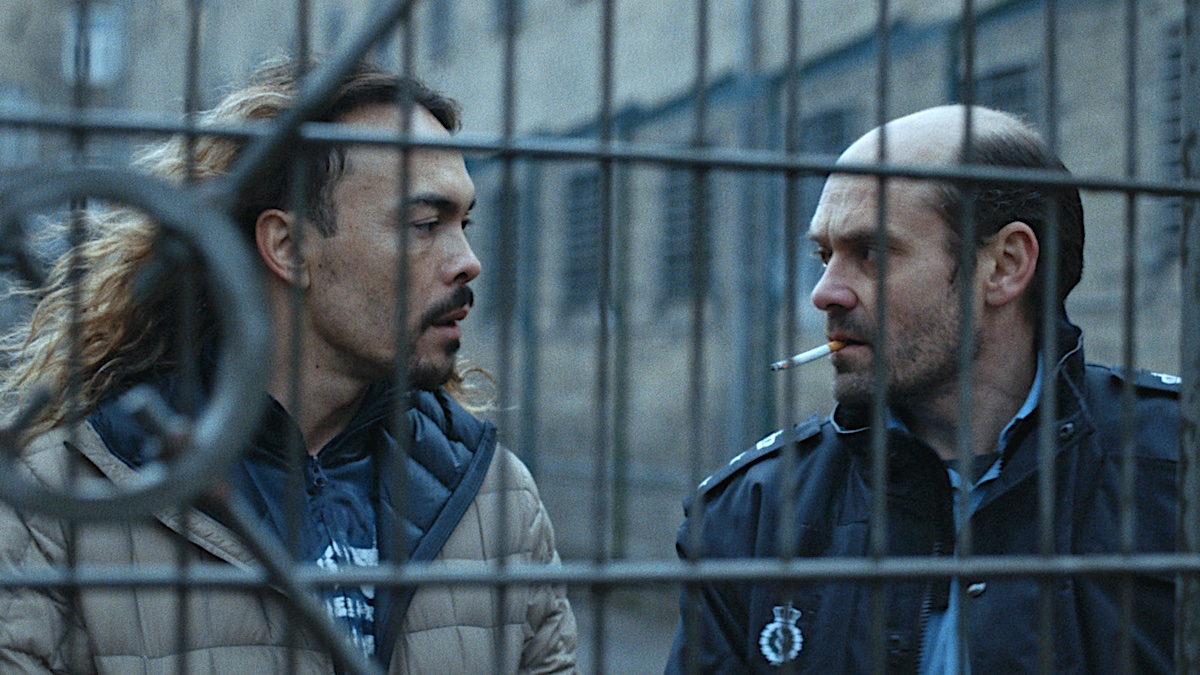Prisoner, BBC Four review - jailhouse rocked by drugs, violence and racism | reviews, news & interviews
Prisoner, BBC Four review - jailhouse rocked by drugs, violence and racism
Prisoner, BBC Four review - jailhouse rocked by drugs, violence and racism
Sofie Gråbøl joins a powerful cast in bruising Danish drama

The notion of prison as a pressure cooker of human behaviour and emotions is hardly a new one, but it can provide formidable fuel for drama. It does so here in this ferociously gripping Danish series, which hails from the same production company as The Killing and The Bridge.
Both of them play prison guards at an establishment known as the House ("Huset" in Danish), where they and their fellow-warders are enmeshed in a permanent struggle to maintain control of a population in a permanent state of seething resentment and incipient violence. Gråbøl plays Miriam, mother of a wayward son trying to kick a crippling drug habit, while Dencik’s Henrik gives the impression of being in control, but he’s teetering on the edge both personally and professionally (pictured below, Youssef Wayne Hvidtfeldt and Gustave Giese).
 The backdrop to the story might seem curiously familiar to British viewers reeling from the endless bombardment of bad news about the collapse of various major institutions in the UK (Prisoner is also likely to trigger flashbacks to Jimmy McGovern’s BBC drama, Time). The Danish prison system depicted here seems equally dysfunctional, being understaffed and under-resourced and plagued by violence, rampant drug abuse and racial antagonism. The white prisoners, who all look like members of a biker gang, football hooligans or white supremacists, face off against a large and well organised Muslim contingent, whose members they tend to address contemptuously as “kebab” or “Taliban”.
The backdrop to the story might seem curiously familiar to British viewers reeling from the endless bombardment of bad news about the collapse of various major institutions in the UK (Prisoner is also likely to trigger flashbacks to Jimmy McGovern’s BBC drama, Time). The Danish prison system depicted here seems equally dysfunctional, being understaffed and under-resourced and plagued by violence, rampant drug abuse and racial antagonism. The white prisoners, who all look like members of a biker gang, football hooligans or white supremacists, face off against a large and well organised Muslim contingent, whose members they tend to address contemptuously as “kebab” or “Taliban”.
In charge of the prison is Gert (Charlotte Fich), who’s trying to chivvy her staff into a superhuman display of control and efficiency because the political authorities are looking for a prison to close down to save money. It’s either going to be this one or another establishment called Ringe. Thus, Gert and her team are trying to convey the impression that they’re in charge of events while they’re under the constant scrutiny of a pair of government inspectors. But it’s a herculean task, since the warders have long since accepted that the only way to keep the place from going up in flames is to turn a blind eye to most of the contraband substances and criminal rackets going on under their noses. The prison is more like a barely-contained explosion than a house of correction.
 All of this comes a shock to Sammi (Youssef Wayne Hvidtfeldt). An intense, driven young man, he joined the prison service because he “wanted to make a difference”, so he can’t understand why veteran warder Henrik tells him to make sure he rattles his keys to warn the inmates that he’s approaching, so they can hide the swag before he gets there.
All of this comes a shock to Sammi (Youssef Wayne Hvidtfeldt). An intense, driven young man, he joined the prison service because he “wanted to make a difference”, so he can’t understand why veteran warder Henrik tells him to make sure he rattles his keys to warn the inmates that he’s approaching, so they can hide the swag before he gets there.
The tensions and conflicts spread way beyond the prison walls, and the prison itself becomes a kind of metaphor for sickness and dysfunction. When Miriam tries to help her son by paying off his debt to his drug dealer, Khaled (Haesam Jakir), she finds herself being ruthlessly manipulated by the criminals. When Henrik (pictured above right with Daniel Flamgaard as Tommy) gets involved in a relationship with an inmate, he too finds himself compromised both privately and professionally. Meanwhile Sammi’s history with the prisoner Benji (Gustave Giese) sets in motion another chain of events heading inexorably for disastrous consequences.
This is hard-hitting stuff, and makes for some painful and depressing viewing. But once you’ve started you’ll find it difficult to stop.
- Episodes 5 & 6 of Prisoner are on BBC Four on Saturday 9 March. The complete series is available on BBC iPlayer
The future of Arts Journalism
You can stop theartsdesk.com closing!
We urgently need financing to survive. Our fundraising drive has thus far raised £49,000 but we need to reach £100,000 or we will be forced to close. Please contribute here: https://gofund.me/c3f6033d
And if you can forward this information to anyone who might assist, we’d be grateful.

Subscribe to theartsdesk.com
Thank you for continuing to read our work on theartsdesk.com. For unlimited access to every article in its entirety, including our archive of more than 15,000 pieces, we're asking for £5 per month or £40 per year. We feel it's a very good deal, and hope you do too.
To take a subscription now simply click here.
And if you're looking for that extra gift for a friend or family member, why not treat them to a theartsdesk.com gift subscription?
more TV
 Mr Scorsese, Apple TV review - perfectly pitched documentary series with fascinating insights
Rebecca Miller musters a stellar roster of articulate talking heads for this thorough portrait
Mr Scorsese, Apple TV review - perfectly pitched documentary series with fascinating insights
Rebecca Miller musters a stellar roster of articulate talking heads for this thorough portrait
 Down Cemetery Road, Apple TV review - wit, grit and a twisty plot, plus Emma Thompson on top form
Mick Herron's female private investigator gets a stellar adaptation
Down Cemetery Road, Apple TV review - wit, grit and a twisty plot, plus Emma Thompson on top form
Mick Herron's female private investigator gets a stellar adaptation
 theartsdesk Q&A: director Stefano Sollima on the relevance of true crime story 'The Monster of Florence'
The director of hit TV series 'Gomorrah' examines another dark dimension of Italian culture
theartsdesk Q&A: director Stefano Sollima on the relevance of true crime story 'The Monster of Florence'
The director of hit TV series 'Gomorrah' examines another dark dimension of Italian culture
 The Monster of Florence, Netflix review - dramatisation of notorious Italian serial killer mystery
Director Stefano Sollima's four-parter makes gruelling viewing
The Monster of Florence, Netflix review - dramatisation of notorious Italian serial killer mystery
Director Stefano Sollima's four-parter makes gruelling viewing
 The Diplomat, Season 3, Netflix review - Ambassador Kate Wyler becomes America's Second Lady
Soapy transatlantic political drama keeps the Special Relationship alive
The Diplomat, Season 3, Netflix review - Ambassador Kate Wyler becomes America's Second Lady
Soapy transatlantic political drama keeps the Special Relationship alive
 The Perfect Neighbor, Netflix review - Florida found-footage documentary is a harrowing watch
Sundance winner chronicles a death that should have been prevented
The Perfect Neighbor, Netflix review - Florida found-footage documentary is a harrowing watch
Sundance winner chronicles a death that should have been prevented
 Murder Before Evensong, Acorn TV review - death comes to the picturesque village of Champton
The Rev Richard Coles's sleuthing cleric hits the screen
Murder Before Evensong, Acorn TV review - death comes to the picturesque village of Champton
The Rev Richard Coles's sleuthing cleric hits the screen
 Black Rabbit, Netflix review - grime and punishment in New York City
Jude Law and Jason Bateman tread the thin line between love and hate
Black Rabbit, Netflix review - grime and punishment in New York City
Jude Law and Jason Bateman tread the thin line between love and hate
 The Hack, ITV review - plodding anatomy of twin UK scandals
Jack Thorne's skill can't disguise the bagginess of his double-headed material
The Hack, ITV review - plodding anatomy of twin UK scandals
Jack Thorne's skill can't disguise the bagginess of his double-headed material
 Slow Horses, Series 5, Apple TV+ review - terror, trauma and impeccable comic timing
Jackson Lamb's band of MI5 misfits continues to fascinate and amuse
Slow Horses, Series 5, Apple TV+ review - terror, trauma and impeccable comic timing
Jackson Lamb's band of MI5 misfits continues to fascinate and amuse
 Coldwater, ITV1 review - horror and black comedy in the Highlands
Superb cast lights up David Ireland's cunning thriller
Coldwater, ITV1 review - horror and black comedy in the Highlands
Superb cast lights up David Ireland's cunning thriller
 Blu-ray: The Sweeney - Series One
Influential and entertaining 1970s police drama, handsomely restored
Blu-ray: The Sweeney - Series One
Influential and entertaining 1970s police drama, handsomely restored

Add comment